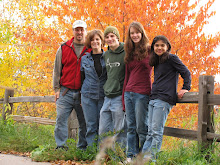This was the June newsletter piece....
In preaching out at Side Lake, we have been working through the book of Joshua. In the past couple of weeks, we have seen a noteworthy contradiction illustrated in two very different characters. In Chapter 6, we see Rahab, a prostitute, who by faith in the God of Israel is spared from the utter destruction of her city of Jericho. In Chapter 7, we see Achan, a member of God’s covenant people, who disobeys God’s command to utterly destroy Jericho and keeps some of the plunder hidden in his tent. As a result, he and his entire family are put to death.
These passages are both difficult passages that display something of God’s character that we would just as soon ignore. As Americans living in the 21st century, we are uncomfortable with the idea of God wiping out an entire nation or having the people execute someone who has broken God’s commands. In these passages from Joshua, we see “the Old Testament God of Fire and Brimstone.” However, when we look deeper at the stories involved, we can see that the Gospel, or good news of Jesus, is evident even in these difficult stories of utter destruction.
First, we need to see how these stories reflect the Holiness of God. We need to understand that the Lord God is altogether perfect and without any blemish. His perfection is so absolute that nothing impure or unholy can exist in his presence. In Deuteronomy 4:24, Moses tells the people “For the Lord your God is a consuming fire, a jealous God.” When we begin to understand the holiness of God, our amazement is not that he would allow the destruction of Jericho or Achan’s family, but that he would not utterly destroy ALL human life. The amazing fact that should be hard to understand is that he shows kindness to Rahab’s family and the people of Israel.
Second, we see God extending his grace to people who do not deserve it. Achan was a part of God’s chosen people. He was, at least outwardly, a worshiper of God. However, he came under judgment for his idolatry. He valued (or worshiped) a coat, a bar of gold, and some silver more than he valued God’s command. Rahab, on the other hand, was a prostitute. Not only that, but she was a foreigner who lived in an idolatrous city that worshiped pagan gods. The reason that Jericho was to be destroyed is that their evil was full or ripe. In this context, Rahab the Prostitute saw that the Lord God of Israel was the real God. She turned her back on the false gods of her people and acted in faith to hide Israeli spies who had come to spy out Jericho. As a result of her faith, God allowed her to be spared from the utter destruction she deserved, along with all those in her family who would trust her to come to her house to await salvation. Ultimately, we find her name listed in the geneology of Jesus. Not only was she saved, but God allowed his own son to descend from her line. This is amazing and undeserved grace!
Third, in the story of Achan we see that disobedience within God’s people results in a removal of his hand of blessing and discipline. As a result of Achan hiding loot under his tent, the army loses its next battle resulting in 36 men dying trying to take a tiny little town of virtually no significance. Achan and his family receive the death penalty as a consequence of Achan’s sin. Was his family also guilty? Were they innocent victims? I don’t know. But the lesson for us to take away is that God takes our sin very seriously – even after we have been saved by his grace and made a part of his people. In both Acts 5 (Ananias and Sapphira) and in 1 Corinthians 11, we see indications that sickness and death are the direct result of sin on the part of believers.
Please don’t misunderstand – not all sickness or untimely death is a direct result of sin. Most of these sufferings are simply a part of living in a fallen world. But keep in mind that God showed mercy to the prostitute who left behind her external religion of pagan idolatry to follow God, but brought judgment on the person who was externally religiously worshiping God, but inwardly worshiped a pile of stuff he hid inside his tent.
So what are you hiding under your tent? When you leave church on Sunday, do you return to your worship of material possessions, relationships, lust, food, or status? Do you literally have things hidden about your house that you know are sinful? Especially for you men, are you secretly worshiping images of creatures in the form of pornography or sexually explicit materials? If so, determine now to repent and seek God’s forgiveness. Take steps to break free from the sin that entangles you. Call me and get ready to meet with other men to learn how you can purge this area of sin from your life as we go through “Every Man’s Battle” together this summer.
Friday, July 11, 2008
Subscribe to:
Post Comments (Atom)




No comments:
Post a Comment